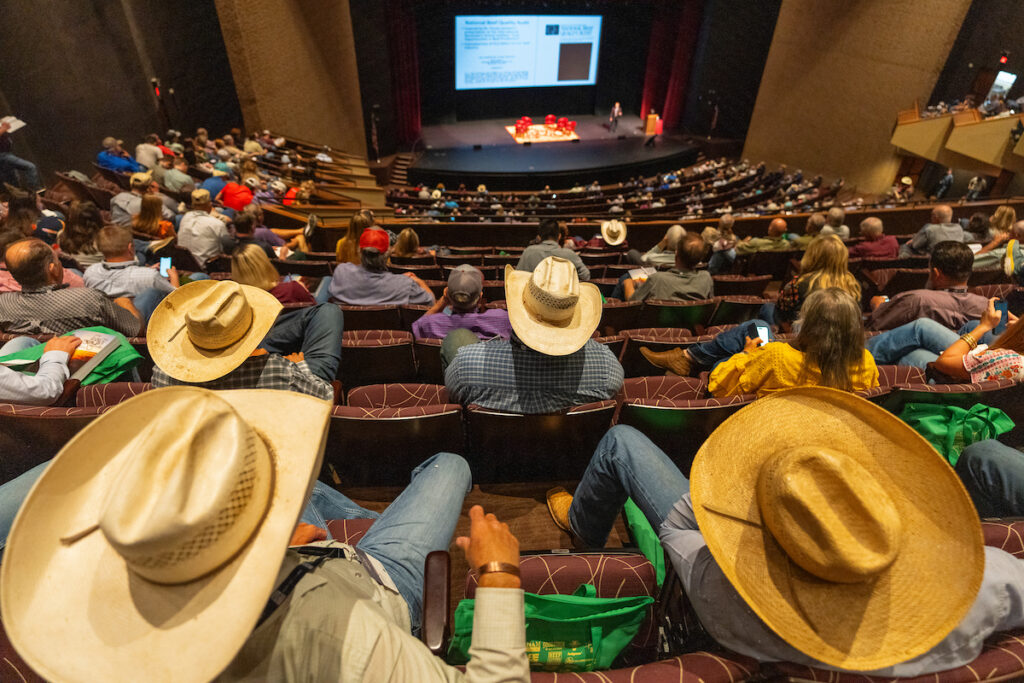‘Rebuilding the Cow Herd’ theme of Texas A&M Beef Cattle Short Course on Aug. 5-7
More than 50 educational hours, 20 courses aimed at helping producers bring operations back to full speed
“Rebuilding the Cow Herd” is the theme of the 70th annual Texas A&M Beef Cattle Short Course on Aug. 5-7 in Bryan-College Station. The event is hosted by the Texas A&M AgriLife Extension Service and the Texas A&M College of Agriculture and Life Sciences Department of Animal Science.
“We are at some of the lowest cow numbers in the U.S. that we’ve seen in a long time,” said Jason Cleere, Ph.D., conference coordinator and AgriLife Extension beef cattle specialist in the Department of Animal Science, Bryan-College Station. “There is interest, with the high calf prices and what looks to be a good market into the foreseeable future, that ranchers are going to start rebuilding the cow herd.”

From the Texas Aggie Prime Rib Dinner to the Cattleman’s College, the nationally and internationally recognized three-day annual event offers producers more than 50 hours of training and 20 courses covering basic practices, new technologies and hot topics in beef cattle production.
The event is the largest beef cattle educational event in the world, with an expected crowd of 2,000 producers from around the world attending, Cleere said. It offers attendees access to over 150 agriculture-related businesses and trade show exhibitors, as well as continuing education units for both pesticide license holders and veterinarians.
Both in-person and virtual attendance are being offered. The cost is $300 for in-person attendance, $160 for virtual if registered by July 27, and $150 for youth. A $40 late registration fee will be charged after July 27. Go online for registration, call 979-314-8507 or email [email protected] for more information.
Keynote speakers address market, weather and cattle
Some of the challenges producers will face this year as they begin rebuilding their herds are a strong demand for replacement females and prices moving higher in relation to that demand, Cleere said.
“We’ve asked our keynote speakers to address the key management factors producers need to keep in mind,” he said. “We are going to have our weather and market outlooks, but we also want to look at the economics on what we can afford to pay and what are some of our options as far as replacement females.”
Randy Blach, CEO of CattleFax, will kick off the general session with his presentation “2024 Market Outlook: Cattle Prices and Input Costs.”
“The biggest discussion among ranchers is how long this cattle market will last,” Cleere said. “After the drought of 2011, the rebuilding began in 2012 and by 2015, there was a rapid decline in cattle prices again. So, the question is: ‘Are these prices going to last a year or two or longer this time?’”
Ranchers want to know what they can afford to pay for replacement females based on future market conditions, he said.
The “Long-Range Weather Planning” presentation will bring Colorado meteorologist Brian Bledsoe to the stage. Cleere said Bledsoe always includes a long-term outlook within the general session to give ranchers more information to help make future management decisions.
After that, David Anderson, Ph.D., AgriLife Extension economist and professor in the Department of Agricultural Economics, will present “What Can I Afford to Pay for a Replacement Female?”
“We want Dr. Anderson to look at the costs associated with replacement females, whether they are keeping their own replacements or purchasing females,” Cleere said. “How do we set the price we can afford to pay based on what we think the future market conditions will be and still remain profitable?”
Finally, “What Are My Replacement Female Options?” with Ron Gill, Ph.D., AgriLife Extension beef cattle specialist, Stephenville, will round out the look at rebuilding the cow herd.
Gill will outline the replacement options – keep our own heifers or purchase mature cows or open cows or cow/calf pairs and some of the practical considerations ranchers need to keep in mind with each option.
Related events
Texas Department of Agriculture pesticide license holders can obtain up to 13 CEUs – two in integrated pest management, one in laws and regulations, one in picolinic acid and nine general continuing education units, CEUs.
A Ranch Horse Program will be offered on Aug. 4 at the Hildebrand Equine Complex. Registration is included with the full Beef Cattle Short Course registration, or, for the ranch horse program only, registration is $60.
Also, up to 32 hours of CEUs will be offered during the Bovine Reproduction Veterinary Continuing Education Program on Aug. 3, the Veterinarian Continuing Education Program on Aug. 4 and the Beef Cattle Short Course Veterinary Continuing Education Program on Aug. 5-7.





